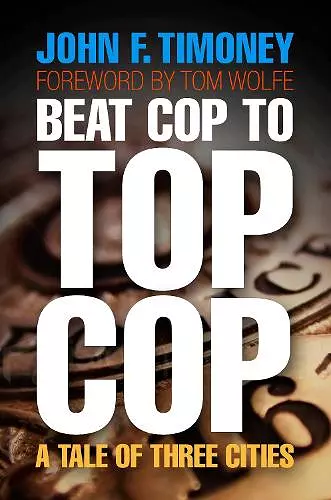Beat Cop to Top Cop
A Tale of Three Cities
Format:Hardback
Publisher:University of Pennsylvania Press
Published:3rd Jun '10
Currently unavailable, and unfortunately no date known when it will be back

From Beat Cop to Top Cop: A Tale of Three Cities documents John Timoney's rise, from his days as a tough street cop in the South Bronx right up to his role as police chief of Miami.
Born in a rough-and-tumble neighborhood of Dublin, John F. Timoney moved to New York with his family in 1961. Not long after graduating from high school in the Bronx, he entered the New York City Police Department, quickly rising through the ranks to become the youngest four-star chief in the history of that department. Timoney and the rest of the command assembled under Police Commissioner Bill Bratton implemented a number of radical strategies, protocols, and management systems, including CompStat, that led to historic declines in nearly every category of crime. In 1998, Mayor Ed Rendell of Philadelphia hired Timoney as police commissioner to tackle the city's seemingly intractable violent crime rate. Philadelphia became the great laboratory experiment: Could the systems and policies employed in New York work elsewhere? Under Timoney's leadership, crime declined in every major category, especially homicide. A similar decrease not only in crime but also in corruption marked Timoney's tenure in his next position as police chief of Miami, a post he held from 2003 to January 2010.
Beat Cop to Top Cop: A Tale of Three Cities documents Timoney's rise, from his days as a tough street cop in the South Bronx to his role as police chief of Miami. This fast-moving narrative by the man Esquire magazine named "America's Top Cop" offers a blueprint for crime prevention through first-person accounts from the street, detailing how big-city chiefs and their teams can tame even the most unruly cities.
Policy makers and academicians have long embraced the view that the police could do little to affect crime in the long term. John Timoney has devoted his career to dispelling this notion. Beat Cop to Top Cop tells us how.
"Both the ugly side of police work-particularly corruption-and the achievements of his beloved NYPD are showcased in this intriguing look at what it takes to fight crime." * Publishers Weekly *
"Beat Cop to Top Cop is a riveting ride inside the accelerating squad car of John Timoney's career. Page by page, you realize that he's the real life version of the celluloid cop envisioned by countless casting directors. They usually get his physical fitness, rugged good looks, proud Irish heritage and honor of the badge. But Timoney is more than that. As he takes readers from the streets of New York City to Philadelphia to Miami, it becomes obvious what sets him apart: a rare blend of both street and intellectual smarts. Timoney's as comfortable with the beat cop or victim as he is with a city's mayor or its media elite. The blue line isn't thin when Timoney is in uniform. You pray he's the man in charge of the police department that answers your call to 911." * Michael Smerconish, nationally syndicated radio host *
"If he had thought of him first, Damon Runyon would have invented John Timoney. A self-made man in the 'Runyonesque' mode, John Timoney recounts his remarkable story in this compelling book. He emerges from these pages as a cop's cop and a chief's chief, with a bit of a poet mixed in." * Ray Kelly, New York City Police Commissioner *
"John Timoney writes like he talks (except, unfortunately for the reader, without his delightful Irish brogue). Beat Cop to Top Cop recounts his brilliant career in an always entertaining and insightful way. True to his Dublin story telling heritage, his tale draws the reader into the always exciting world of policing from the beat to the Commissioner's suite." * Bill Bratton, former Chief of Police, Los Angeles *
"John Timoney is pure cop: tough and blunt, sensitive and caring. Deputy Commissioner in New York City, Commissioner in Philadelphia, and Chief in Miami, Timoney helped create Compstat and reduce crime in New York, bring homicide under control in Philadelphia, and demonstrated in Miami that he could reduce police shootings without endangering officers or allowing crime to increase." * George L. Kelling, author of Fixing Broken Windows: Restoring Order And Reducing Crime In Our Communities *
ISBN: 9780812242461
Dimensions: unknown
Weight: unknown
352 pages